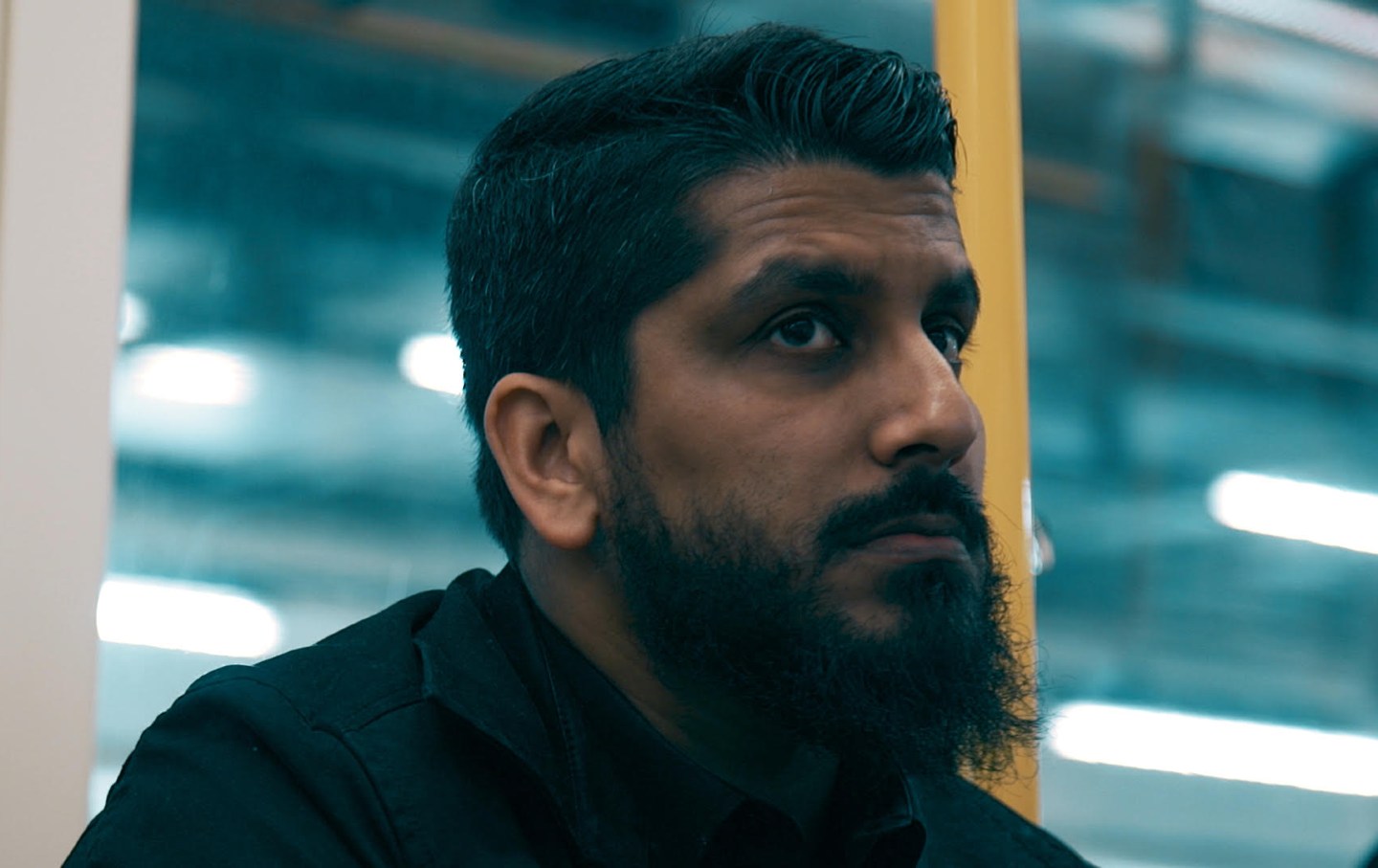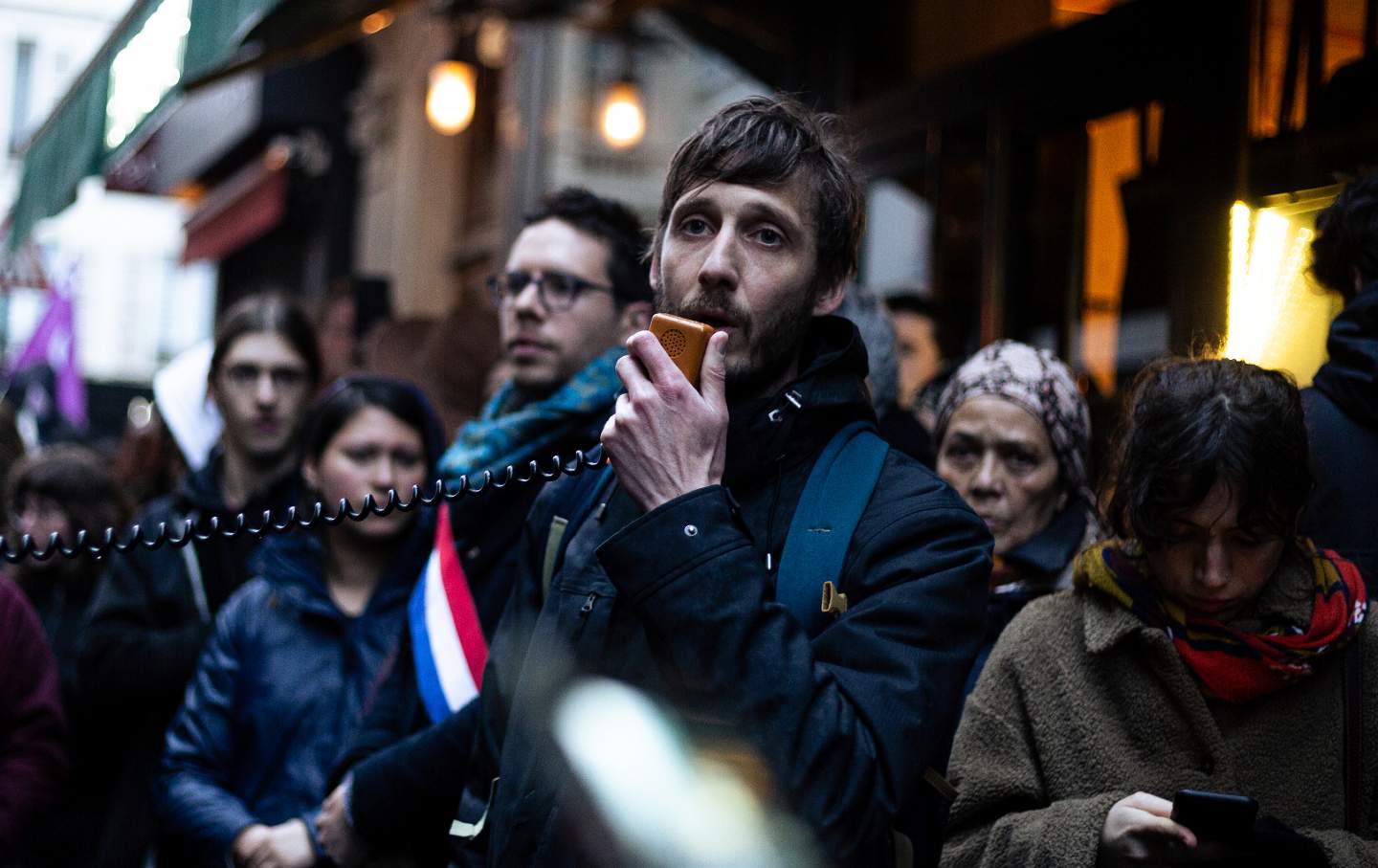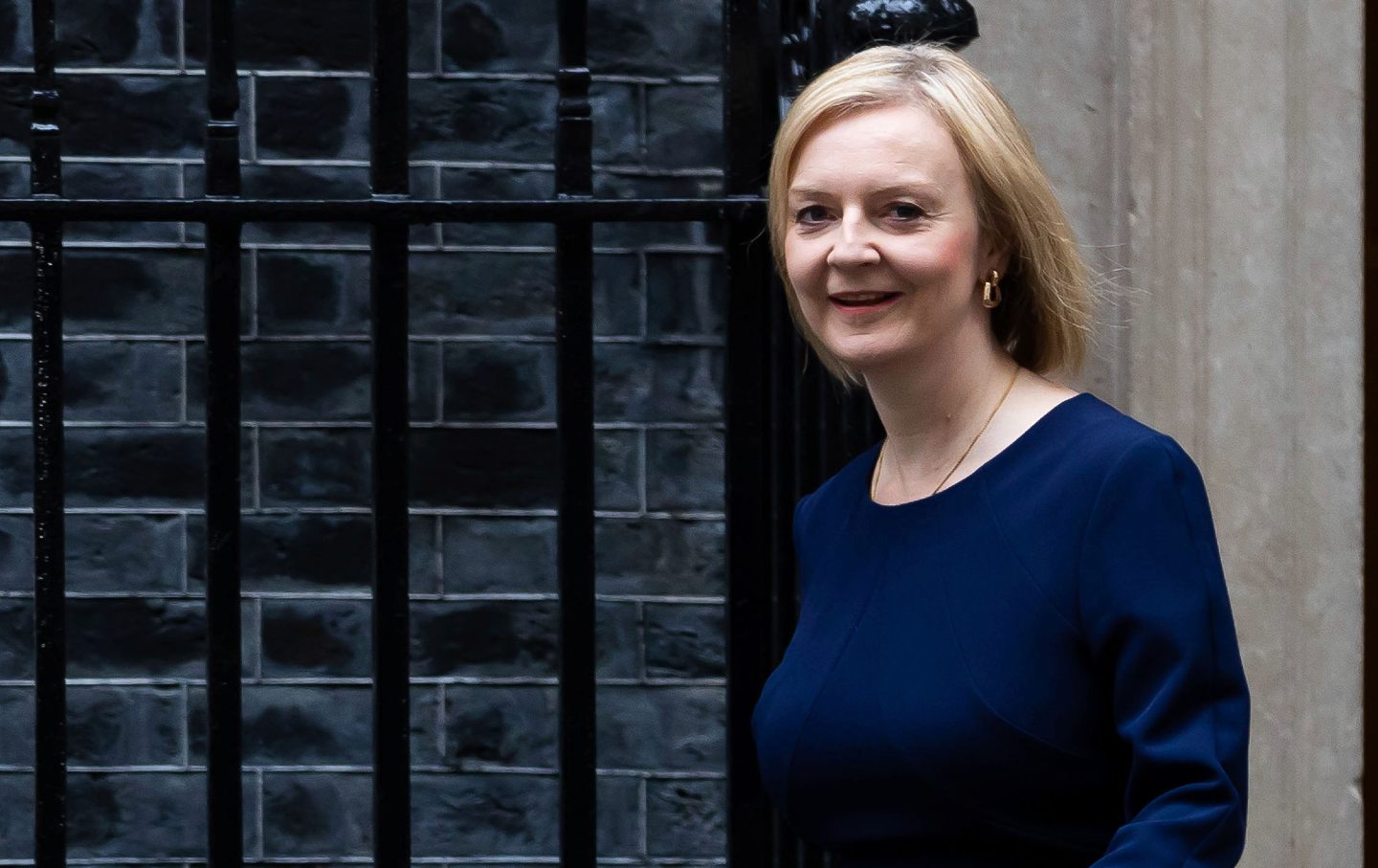The Ghosts of the Worldwide Surveillance Apparatus Show Their Hand
Phantom Parrot, a British documentary now screening in the US, sheds light on the Orwellian technologies being used across borders to repress activists, journalists, and others.

“They were not really interested in me. They were just interested in my devices,” says human rights activist Muhammad Rabbani as the camera pans to footage of a commercial plane flying through slate-gray skies. The scene appears early on in Phantom Parrot, a documentary by British filmmaker Kate Stonehill about Rabbani’s 2017 detention under Schedule 7 of the United Kingdom’s 2000 Terrorism Act, which allows British border officials to stop, detain, and interrogate anyone regarding possible involvement in terrorism. Although the founder of CAGE, a campaign group that advocates on behalf of Global War on Terror victims, had been stopped a handful of times under the law’s wide-reaching powers, this time was different. This time, Rabbani explains, his phone and laptop were confiscated, and, when he refused, as he had done before, to provide passcodes to his electronic devices, he was charged and ultimately convicted under the Terrorism Act.
Phantom Parrot, which screened for the first time in the United States at Washington, D.C.’s Double Exposure Investigative Film Festival and is expected to reach American audiences early next year, provides an in-depth look at how a law that was passed seven years before the first iPhone was released now provides broad cover for British border authorities to search and confiscate phones and even download a breathtaking amount of private data. The film’s eerie title may seem like a creative flourish, but it is actually the name of a UK government program. A GCHQ document, which was among the National Security Agency files leaked by whistleblower Edward Snowden in 2013 but unpublished until 2017, revealed that Britain has developed Phantom Parrot—a searchable database of information confiscated at UK borders.
What’s perhaps worse, as the document details, is that the “data is legally volunteered under Sc[hedules] 7 and 8 of TACT (Terrorism Act 2000), although the person will not be directly told their phone is downloaded.”
The UK’s 2000 Terrorism Act—passed prior to the War on Terror, but used since 2001 largely to target Muslims and other ethnic minorities—is as far-reaching as anti-terrorism laws come. Using grainy parliamentary footage from the lead-up to a nearly unanimous Labour vote that passed the Terrorism Bill into law, Phantom Parrot highlights that there was hardly any opposition to it. In fact, there were only three votes against it—two of which were cast by Jeremy Corbyn and John McDonnell, the Labour Party’s former leader and shadow chancellor of the exchequer from 2015 to 2020.
“I am not in any way in favor of violence, in any way in favor of terrorism, but you don’t defeat those problems by imprisoning the innocent,” a not-yet-white-haired Corbyn warned his fellow MPs nearly a quarter of a century ago.
The Terrorism Act was billed back then as a means to protect Britain’s national security, but recent cases raise questions about whether the UK is using the act to obtain sensitive information for allies such as the United States, France, Turkey, Israel, and others. The Phantom Parrot protagonist’s devices were finally returned five years after they were originally confiscated, but Rabanni has never been able to confirm whether his data was downloaded. As the film illustrates, he suspects that the main reason behind this confiscation actually had to do with a case being brought by Ali al-Marri, a Qatari national who was detained on US soil in 2001 as an “enemy combatant” and allegedly tortured by the FBI. Sensitive data from al-Marri’s case was on the CAGE director’s laptop as he arrived in London after meeting al-Marri in Qatar.
Rabbani is far from the only person whose targeting has been raising eyebrows across borders. David Miranda, journalist Glenn Greenwald’s late partner, was detained under the same law while carrying Snowden’s NSA leaks in 2013—though his devices were not confiscated. More recently, The Nation reported that a French publisher on his way to the London Book Fair in April was detained under Schedule 7 and, like Rabbani, was arrested and forced to give up his electronic devices for several months. Ernest Moret’s case spurred international alarm due to the lines of questioning regarding the publisher’s activism in France’s gilets jaunes movement, domestic French politics, and “anti-government authors” published by Moret’s employer, the left-wing publisher La Fabrique. British border officials “boasted” to Moret that “the UK’s the only country where authorities can download and keep information from private devices,” according to Sebastien Budgen, senior editor at Verso Books, who spoke with Moret after his arrest.
In September, The Guardian reported that a number of UK citizens and visitors with ties to the Kurdish liberation movement have been detained under the same section of the 2000 act. Matt Broomfield, a freelance British journalist who spent three years reporting from Rojava—the region of northeast Syria under Kurdish control—was subjected to five hours of interrogation upon entering his native country in August. Despite initial declarations from anti-terrorism officers that they did not want to compromise his journalistic sources, Broomfield says they went on to ask him who paid for his reporting, whether he considered his journalism biased, and for his views on Turkish and British policies in the Middle East. Broomfield, unlike Moret and Rabbani, did provide passwords to his devices—which the journalist says he’d wiped of private data prior to traveling—but British officers still held on to his phone, laptop, and ebook seemingly indefinitely.
“In both Moret’s case and my case, [the UK government is] targeting people simply for critical coverage, critical thought, which is obviously of concern to all people interested in civil liberties,” Broomfield told The Nation. The 29-year-old journalist, who is taking legal action to obtain his devices, emphasized that while the UK’s National Union of Journalists has supported him throughout and he has a platform to shed light on the incident, “this kind of thing happens to a lot of ordinary people who probably don’t even understand what’s happening or understand their rights, and [Schedule 7] is used to criminalize the Kurdish community as a whole.”
To Broomfield, it’s quite “clear” that Britain was trying to obtain information for the Turkish authorities who have been openly hostile to the Kurdish community. In Moret’s case, Jonathan Hall KC, the government-appointed Independent Reviewer of Terrorism Legislation since 2019, released an extraordinary report on the French publisher’s Schedule 7 detention in July. In it Hall says that the publisher’s devices were returned “unexamined” and that although data from his phone’s SIM card had been downloaded, “the data has not been disseminated and has now been made inaccessible.” Hall also denied that the UK detained Moret on France’s behalf, adding that “Schedule 7 cannot be exercised, and there is no indication that this was the case here, on behalf of a foreign government”—something Moret’s lawyer Richard Parry says he still finds “hard to believe.”
Given the clearly international nature of these issues, Phantom Parrot also aims its piercing lens at one of the UK’s closest allies. The film actually opens on US soil in Myrtle Beach, S.C., inside a training session by Canadian software company Magnet Forensics at the 2021 Techno Security and Digital Forensics Conference. Magnet Forensics is one of a growing number of software companies that sell mobile device forensic tools and other specialist technology used by border officials, police, militaries, and others to extract data from devices worldwide.
“The National Institute of Standards and Technology guidelines say we have to be minimally invasive [to someone’s rights],” declares a self-proclaimed “gun nut” from Texas. He then goes on to show the training’s attendees how private data on a device can be accessed even if the owner has deleted its contents or “throw[s] it into the ocean [and] the salt water destroys it.”
Popular
“swipe left below to view more authors”Swipe →US Customs and Border Protection (CBP) officers may not have the luxury of Schedule 7 stops, but, unlike most American authorities, border officials do not need a warrant to search or download data from electronic devices—something they do with alarming frequency. Just last year, it was revealed that CBP downloads data from up to 10,000 phones a year and stores their content on a database, accessible to 2,700 federal employees, for 15 years. CBP—like police forces in every single US state, as Phantom Parrot notes—use the very same, increasingly sophisticated technologies featured in the film. And yet, as opposed to their British peers, American border officials cannot take any legal action against Americans who refuse to hand over their passwords, despite reports of threats to fine or refuse entry to those who don’t. Foreigners visiting the United States, on the other hand, can be denied entry.
It’s also worth noting that surveillance powers and technologies have been disproportionately used to target Muslims in the US, UK, and elsewhere. Of the four UK Schedule 7 stops detailed, only Rabanni’s resulted in a terrorism conviction, despite the similarities across cases—a conviction that was cited in recent months as justification for banning the human rights campaigner from entering France and Poland. In 2022, the American Civil Liberties Union sued CBP on behalf of three Muslim Americans after they were asked about their political beliefs and pressed to provide passwords to their mobile phones during border interrogations.
Now, as Phantom Parrot travels across the Atlantic for its US run, director Kate Stonehill tells The Nation that she hopes American audiences will recognize how mobile device forensic tools are being used for a number of repressive reasons that have nothing to do with terrorism—including to criminalize women seeking abortions in the United States. Their use has also had a chilling effect on the right to protest in Europe, as well as on press freedoms, given the attempts to intimidate journalists like Greenwald and Broomfield.
“The stakes for understanding the implications of surveillance in the current political landscape are incredibly high,” warns the documentarian.
More from Natasha Hakimi Zapata

The Recent Riots in the UK Should Be a Warning to Kamala Harris The Recent Riots in the UK Should Be a Warning to Kamala Harris
Like the Tories, the new Labour government wants to blame immigration for Britain’s current troubles, but these have less to do with immigration than with deprivation.

Facing Far-Right Riots, Britain’s History—Good and Bad—Repeats Itself Facing Far-Right Riots, Britain’s History—Good and Bad—Repeats Itself
Days of anti-immigrant violence across the United Kingdom were met with powerful anti-racist resistance after a tragedy left the country reeling.

What the Cass Review Means for Trans Kids in Britain—and Beyond What the Cass Review Means for Trans Kids in Britain—and Beyond
A new review of gender-affirming healthcare in England could change the way gender-questioning children and young everywhere people receive care.

The Progressive Refugee Policy That Puts the West to Shame The Progressive Refugee Policy That Puts the West to Shame
Uganda’s role as a co-convenor of the Global Refugee Forum in Geneva this week should raise urgent questions about the interests behind its much-lauded open-door refugee policy.

What the UK’s Arrest of a French Publisher Means for Public Intellectuals the World Over What the UK’s Arrest of a French Publisher Means for Public Intellectuals the World Over
The detention of Ernest Moret raises urgent questions about British authorities’ targeting public intellectuals at the request of other nations.

Liz Truss or No Liz Truss, Things Are Bleaker in Britain Than Anyone Realizes Liz Truss or No Liz Truss, Things Are Bleaker in Britain Than Anyone Realizes
As jaws drop around the world over the resignation of the UK’s shortest-lived prime minister, life here is getting considerably worse by the day.


